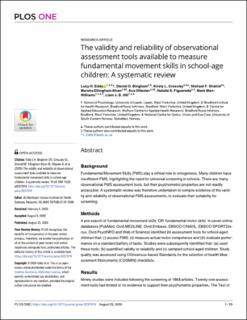| dc.contributor.author | Eddy, Lucy H. | |
| dc.contributor.author | Bingham, Daniel D. | |
| dc.contributor.author | Crossley, Kirsty L. | |
| dc.contributor.author | Shahid, Nishaat F. | |
| dc.contributor.author | Ellingham-Khan, Marsha | |
| dc.contributor.author | Otteslev, Ava | |
| dc.contributor.author | Figueredo, Natalie S. | |
| dc.contributor.author | Mon-Williams, Mark | |
| dc.contributor.author | Hill, Liam J. B. | |
| dc.date.accessioned | 2021-04-26T09:01:43Z | |
| dc.date.available | 2021-04-26T09:01:43Z | |
| dc.date.created | 2020-12-02T14:26:13Z | |
| dc.date.issued | 2020 | |
| dc.identifier.citation | Eddy, L. H., Bingham, D. D., Crossley, K. L., Shahid, N. F., Ellingham-Khan, M., Otteslev, A., ... & Hill, L. J. (2020). The validity and reliability of observational assessment tools available to measure fundamental movement skills in school-age children: A systematic review. PloS one, 15(8), e0237919. | en_US |
| dc.identifier.issn | 1932-6203 | |
| dc.identifier.uri | https://hdl.handle.net/11250/2739505 | |
| dc.description.abstract | Background: Fundamental Movement Skills (FMS) play a critical role in ontogenesis. Many children have insufficient FMS, highlighting the need for universal screening in schools. There are many observational FMS assessment tools, but their psychometric properties are not readily accessible. A systematic review was therefore undertaken to compile evidence of the validity and reliability of observational FMS assessments, to evaluate their suitability for screening.
Methods: A pre-search of ‘fundamental movement skills’ OR ‘fundamental motor skills’ in seven online databases (PubMed, Ovid MEDLINE, Ovid Embase, EBSCO CINAHL, EBSCO SPORTDiscus, Ovid PsycINFO and Web of Science) identified 24 assessment tools for school-aged children that: (i) assess FMS; (ii) measure actual motor competence and (iii) evaluate performance on a standard battery of tasks. Studies were subsequently identified that: (a) used these tools; (b) quantified validity or reliability and (c) sampled school-aged children. Study quality was assessed using COnsensus-based Standards for the selection of health Measurement INstruments (COSMIN) checklists.
Results: Ninety studies were included following the screening of 1863 articles. Twenty-one assessment tools had limited or no evidence to support their psychometric properties. The Test of Gross Motor Development (TGMD, n = 34) and the Movement Assessment Battery for Children (MABC, n = 37) were the most researched tools. Studies consistently reported good evidence for validity, reliability for the TGMD, whilst only 64% of studies reported similarly promising results for the MABC. Twelve studies found good evidence for the reliability and validity of the Bruininks-Oseretsky Test of Motor Proficiency but poor study quality appeared to inflate results. Considering all assessment tools, those with promising psychometric properties often measured limited aspects of validity/reliability, and/or had limited feasibility for large scale deployment in a school-setting.
Conclusion: There is insufficient evidence to justify the use of any observational FMS assessment tools for universal screening in schools, in their current form. | en_US |
| dc.language.iso | eng | en_US |
| dc.rights | Navngivelse 4.0 Internasjonal | * |
| dc.rights.uri | http://creativecommons.org/licenses/by/4.0/deed.no | * |
| dc.title | The validity and reliability of observational assessment tools available to measure fundamental movement skills in school-age children: A systematic review | en_US |
| dc.type | Peer reviewed | en_US |
| dc.type | Journal article | en_US |
| dc.description.version | publishedVersion | en_US |
| dc.rights.holder | © 2020 Eddy et al. | en_US |
| dc.source.volume | 15 | en_US |
| dc.source.journal | PLOS ONE | en_US |
| dc.source.issue | 8 | en_US |
| dc.identifier.doi | https://doi.org/10.1371/journal.pone.0237919 | |
| dc.identifier.cristin | 1855399 | |
| dc.source.articlenumber | e0237919 | en_US |
| cristin.ispublished | true | |
| cristin.fulltext | original | |
| cristin.qualitycode | 1 | |

